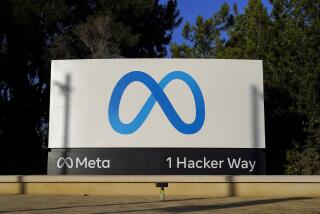Dad gives daughter $200 to stay off Facebook for five months
- Share via
Every person has their price, and for a 14-year-old Boston girl, her price to quit Facebook is $200.
Paul Baier and his daughter entered into a contract he posted on his blog this week that will earn the daughter $200 if she can stay off of the 1-billion member social network for five months.
The story of Baier and his daughter’s unusual “Facebook Deactivation Agreement” has gone viral, but such a pact isn’t new and for most people not necessary.
In fact, most adult users have tried without financial incentives.
QUIZ: How much do you know about Facebook?
A report released by Pew Internet this week says that 61% of Facebook users in the U.S. 18 and older have also taken a “Facebook vacation” for several weeks or more.
However, most people don’t leave Facebook for money, like Baier’s daughter. Instead, the report found the most prevalent reason that people decide to take a break from the popular social network is because they’re just too busy for it.
Of course, that reasoning probably doesn’t surprise many people. But what might surprise users is the measures some are taking to stay off Facebook.
Recently, I chatted with Faisal Abid, 22, a member of Toronto’s startup community, who late last month co-launched FAddict.io, a website built to help “Facebook addicts” recover.
The site lets people send $5 to FAddict as a pledge that they will stay off Facebook for an entire month. If they complete their “rehab,” they’ll get their $5 back, but if they “relapse,” they lose the money and FAddict donates it to the Centre for Addiction and Mental Health.
PHOTOS: Freshest Facebook features
FAddict monitors the profiles of people who pledged and will notify them if it detects they have logged onto Facebook.
So far a couple dozen people have signed up with FAddict. Because the startup is only 3 weeks old, no one has completed the 30-day challenge but so far no one has relapsed either -- at least as of early Thursday.
“We’re not sure what personal motivations are for our users, but what we feel is Facebook is becoming more of a burden in their lives and taking a break is healthy,” Abid said.
With Facebook essentially an online directory of all your contacts, it’s very hard to not be on it in some way or form. But Abidal said it’s important to remember that Facebook “isn’t a part of life but just a simple, dispensable tool.”
ALSO:
Facebook study: Growth fueled by desire for self-affirmation
Tumblr testing real-time notifications for likes and reblogs
NBC shuts down hyper-local news site EveryBlock [Updated]
More to Read
Sign up for Essential California
The most important California stories and recommendations in your inbox every morning.
You may occasionally receive promotional content from the Los Angeles Times.











